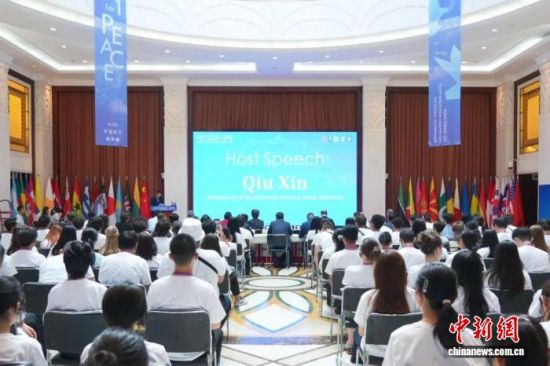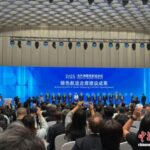Focusing on the theme “A New Vision for AI Governance: Peace, Mutual Trust, and Inclusivity in a New Era,” the finals of the 16th Youth Innovation Competition on Global Governance (YICGG) opened at Fudan University.
Nearly 100 participants from 38 countries advanced to the finals. The university leadership encouraged competitors to integrate artificial intelligence as a key driver for reforming global governance systems, transforming it into a digital bridge that narrows divides, connects people, fosters consensus, and upholds peace. They also expressed hopes for the competition to expand its platform, inspire youth innovation, and contribute to global governance.
This year marks the 80th anniversary of the victory in the Chinese People’s War of Resistance against Japanese Aggression and the World Anti-Fascist War, as well as the 80th anniversary of the United Nations. The competition encourages young participants to translate the UN Sustainable Development Goals (SDGs), particularly those related to “Peace, Justice, and Strong Institutions,” into actionable solutions for fostering new international relations. Through practical governance proposals and ethical institutional innovations, the event aims to illuminate the path toward world peace with AI.
Launched in 2007 by Fudan University and the United Nations Development Programme (UNDP), YICGG is the first international innovation competition in the field of global governance initiated by Chinese university students. It serves as a platform for youth worldwide to engage in discussions on global issues and participate in governance.
During the finals, young participants from 38 countries and 52 universities gathered at YICGG’s founding location to collaborate on AI-driven solutions for global peace. Over five days, competitors were randomly grouped into 12 “World Teams” to develop innovative proposals aligned with the theme. The event featured passionate speeches, field research, global governance forums, collaborative workshops, and final presentations, fostering dynamic exchanges between experts and participants.
In a video address, the Rector of the United Nations University emphasized that youth voices should be central to crafting solutions for international challenges, describing the competition as not just an academic contest but a call to governance action.
In the coming days, participants will refine their proposals on how AI can better serve global peace and well-being. A returning competitor from Spain shared how YICGG improved his public speaking and policy-making skills while expanding his network. He expressed enthusiasm for exploring AI applications in energy, agriculture, and other sectors with peers to advance peace.
A participant from North Macedonia highlighted her academic focus on generative AI’s role in promoting social equity and education, valuing the opportunity to exchange ideas with international peers and judges.
Proposals included an AI-powered UN peacekeeping mechanism for data-driven policy analysis, a Brazilian-developed “PaxAI” platform for conflict mediation and resource coordination, and a Georgian-Canadian team’s “SocialAI” and “ZeroHungerAI” modules to combat misinformation and predict conflict risks while ensuring privacy and legal compliance.
Fudan University
Fudan University, located in Shanghai, China, is one of the country’s most prestigious and oldest universities, founded in 1905. Initially named “Fudan Public School,” it was established to promote modern education and has since grown into a comprehensive research institution with a strong global reputation. The university played a significant role in China’s academic and cultural development, merging with several other schools over the years and becoming a key center for higher education and innovation.
Youth Innovation Competition on Global Governance (YICGG)
The **Youth Innovation Competition on Global Governance (YICGG)** is an international platform founded in 2007 by **Fudan University** and the **United Nations Development Programme (UNDP)** to engage young minds in addressing global challenges. It encourages innovative policy proposals on issues like sustainable development, climate change, and digital governance, fostering cross-cultural collaboration among youth worldwide. The competition has grown into a prestigious forum, empowering future leaders to contribute to global governance solutions.
United Nations
The United Nations (UN) is an international organization founded in 1945 after World War II to promote peace, security, and cooperation among nations. Comprising 193 member states, it addresses global issues like human rights, climate change, and development through bodies such as the General Assembly and Security Council. Its headquarters in New York City symbolizes diplomacy and multilateralism.
United Nations Development Programme (UNDP)
The **United Nations Development Programme (UNDP)**, established in 1965, is a global development network under the United Nations that promotes sustainable development, poverty reduction, and democratic governance. Operating in over 170 countries, it focuses on tackling climate change, inequality, and crises while supporting policy innovation and capacity-building. The UNDP also publishes the annual **Human Development Index (HDI)**, a key measure of global progress.
United Nations University
The United Nations University (UNU) is a global research and teaching institution established in 1973 as the academic arm of the United Nations. Headquartered in Tokyo, Japan, it focuses on pressing global issues such as sustainability, development, and peace, collaborating with researchers and policymakers worldwide. Its mission is to contribute to solving the UN’s key challenges through interdisciplinary research and capacity-building initiatives.
PaxAI
PaxAI does not appear to refer to a widely recognized place or cultural site. If you meant a specific location, organization, or concept (such as *Pax Romana*, *Pax Americana*, or an AI-related term like *Pax AI*), please provide additional details so I can offer an accurate summary. Alternatively, if you’re referring to a lesser-known or fictional site, clarifying its context would help!
SocialAI
“SocialAI” is a digital platform or cultural concept focused on the intersection of artificial intelligence and social interaction, exploring how AI can enhance communication, creativity, and community-building. While its exact origins may vary, it reflects broader trends in AI-driven social technologies, such as virtual assistants, AI-generated content, and online collaboration tools. The site or idea likely represents the evolving role of AI in shaping modern digital culture and human connections.
ZeroHungerAI
“ZeroHungerAI” appears to be a conceptual or hypothetical initiative aimed at leveraging artificial intelligence to combat global hunger, though no widely recognized cultural or historical site by this name exists. If real, such a project might use AI to optimize food distribution, improve agricultural yields, or address food insecurity through data-driven solutions. Without specific historical details, it likely represents modern efforts to merge technology with humanitarian goals for sustainable development.





